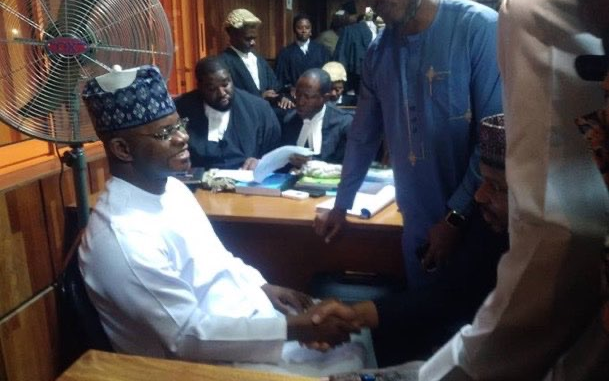
The Federal High Court in Abuja has adjourned the trial of former Kogi State governor, Yahaya Bello, to December 10 while remanding him in the custody of the Economic and Financial Crimes Commission (EFCC).
The EFCC had also opposed his bail application in court on Wednesday.
Yahaya Bello had earlier pleaded “not guity” to the 16 counts charge brought against him by the Economic and Financial Crimes Commission at the Federal High Court.
His case was adjourned to December 10 for the reading of his bail application. He is to remain with the EFCC, SaharaReporters learnt.
The fraud trial involving Yahaya Bello, had become chaotic on Wednesday morning when a crowd of his supporters stormed the court room.
Bello, who was arraigned at the FCT High Court on Wednesday, had asked his rascally followers and aides to leave the courtroom to ensure sanity.
Thereafter, Justice Maryann Anenih took the plea of the former governor and two others.
Meanwhile, Kemi Pinheiro SAN led the federal government’s legal team for the arraignment, while Joseph Bodunde Dauda SAN led the legal team for the former governor in the 16-count charges.
SaharaReporters reported earlier that Yahaya Bello was brought to court around 8:50am on Wednesday.
Bello, who served as governor from 2016 to 2023, faces charges related to the mismanagement of state funds, as well as accusations of embezzlement and abuse of office.
Earlier in November, SaharaReporters reported that the EFCC had filed fresh charges against former governor, Bello, accusing him of N110 billion fraud.
The EFCC had initially filed 19 charges against the former Kogi governor, along with his nephew Ali Bello, Dauda Suliman, and Abdulsalam Hudu, for money laundering offences amounting to N80,246,470,088.88.
In the fresh charges dated September 25, the total amount involved is N110,446,470,89.00.
The Federal Capital Territory High Court, sitting in Maitama, Abuja, had dismissed the oral bail applications of Abdulsalam Hudu and Umar Oricho, who are co-defendants of Yahaya Bello in the N110.4billion fraud case preferred again them by the EFCC.
